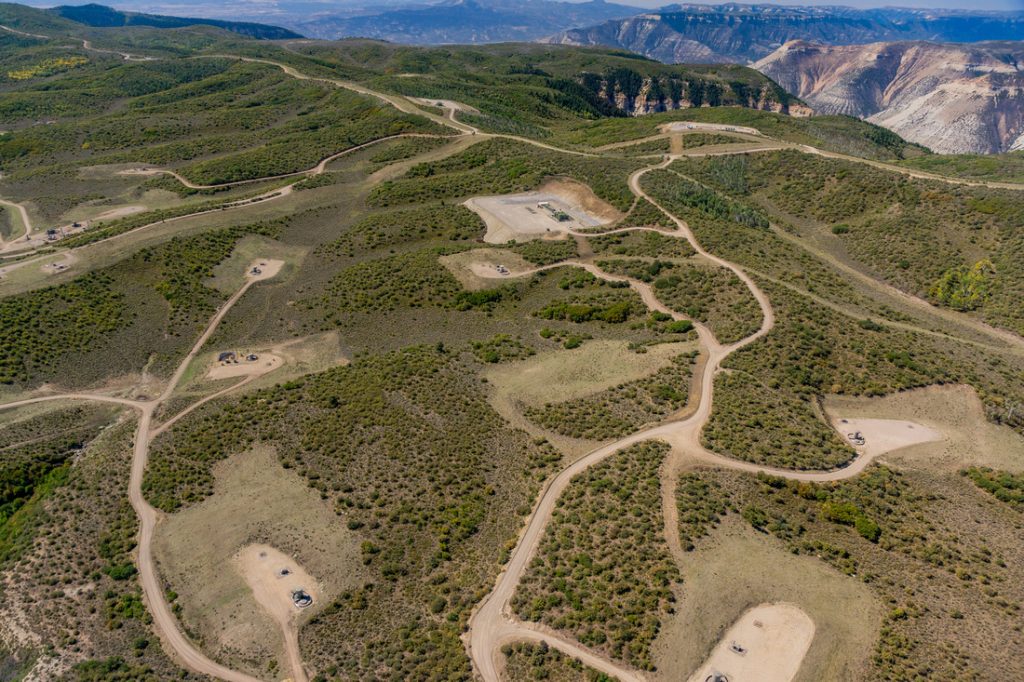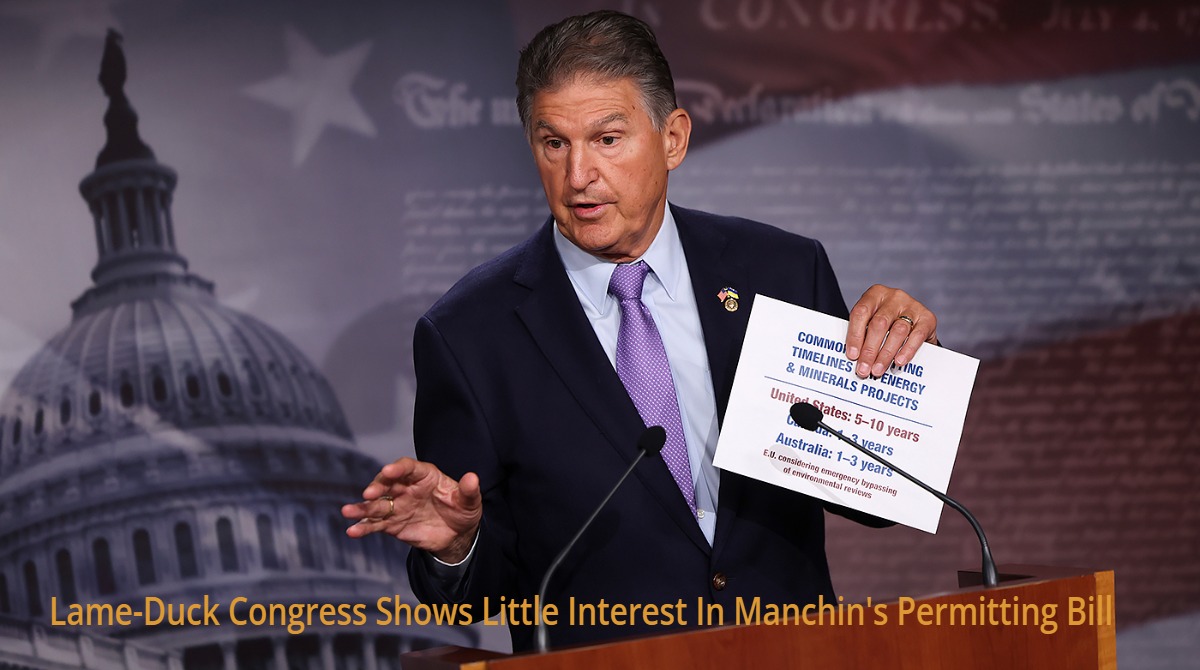U.S. Sen. Joe Manchin’s proposal to speed up the federal government‘s permitting process. Certifying energy projects do not harm the environment is one of the items on Congress’ lengthy to-do list by the end of the year.
However, the bill was a requirement of the centrist West Virginia Democrat’s support. For his party’s more significant tax, health care, and climate change measure earlier this year. It may still lack the support it needs to pass. Because progressive Democrats are worried about its impact on environmental protections.
Manchin and his supporters in the oil, gas, and coal industries. Who has pushed for years to relax federal permitting requirements? It would be disappointing if a bill is not passed this year. Some proponents of renewable energy also contend that federal permitting must change for wind and solar technology to realize its full potential.

However, it would be good news for environmentalists. Who claims that the bill would weaken an essential environmental law. That safeguards communities from pollution while offering little additional renewable energy capacity.
Congress anticipated remaining in session for the majority of December. Before reconvening in January with a split government as Republicans win a narrow majority in the House.
The government affairs director for the environmental organization Center for Biological Diversity. Which opposes the Manchin bill, said of the lame-duck session of Congress, “It’s a pretty tight calendar, and they have a lot they have to do.” Do you spend much time on a highly polarizing bill, then?
Concerns about environmental justice
Environmental organizations have opposed the bill, including those in the environmental justice movement. Which works to shield marginalized communities from pollution.
The legislation would limit the ability of communities to legally contest agency decisions. They set time limits on environmental reviews.
According to a November 15 letter from 70 environmental justice organizations to President Joe Biden. “Senator Manchin’s legislation is a harbinger for the permanent silencing of environmental justice communities in the permitting process. while also eviscerating the rights to due process in a court of law. It should they deem it necessary to protect their communities from harm.”

U.S. Rep. Raul Grijalva, a liberal Democrat from Arizona chairs the House Natural Resources Committee. It is publicly opposed to the Manchin bill and distributed the letter on Monday.
The National Environmental Policy Act, or NEPA, demands that environmental reviews of major projects be finished within two years. All others within one. These requirements are the focus of the Manchin bill.
These deadlines don’t weaken the legal requirements. Still, according to Aaron Weiss, deputy director of the environmental organization Center for Western Priorities. An arbitrary deadline without additional funding to finish reviews could force agencies to take shortcuts.
And when agencies skimp on NEPA reviews, Weiss continued, “that’s how they get bogged down in court for years.” The irony of at least the most recent Manchin proposal is that it didn’t seem like it would significantly speed up NEPA reviews and might even have the opposite effect.
The Manchin bill’s clause approving the Mountain Valley Pipeline, a natural gas pipeline in West Virginia and Virginia, is a significant sticking point.
Democratic U.S. Senator Tim Kaine from Virginia stated earlier this year that he opposed the legislation due to that clause. According to him, the pipeline should go through regular environmental reviews.
Green Power
A deal between Senate Majority Leader Chuck Schumer and Manchin included the permitting bill in exchange for his support for the Democrats’ expansive climate, health care, and tax bill, which included $370 billion in clean energy spending.
At the time, Schumer stated that while he didn’t particularly like the idea of weakening environmental laws, it was a necessary concession to Manchin for the larger bill to pass. He added that reforms might quicken clean energy initiatives.
In a press conference after the Senate passed the Inflation Reduction Act in August, he stated, “I didn’t like the permitting reform, but it was something that Sen. Manchin wanted. “We made some changes to it, and it has some very good environmental features. It will simplify the permitting process for clean energy.

However, that argument is yet to gain traction. Because environmentalists are opposed to giving up long-standing federal safeguards in exchange for allowing changes that would increase the production of clean energy and fossil fuels.
According to Hartl of the Center for Biological Diversity, “it is pretty naive to think that if we gut NEPA, the bigger winner would somehow be renewable energy.”
According to Lisa Frank, executive director of Environment America’s Washington office, “I think (renewable energy) transmission is important.” “But we don’t see it as this do-or-die situation. Where we have to pass something by December or a future powered by clean energy is destroyed,” the author said.
Potential this year
There are hints that Manchin and Schumer are still trying to appease. The bill’s opponents and get it to pass this year, probably as an add-on to a government funding bill or the annual defense authorization.
The White House backs you up. During the November 10 White House daily briefing, press secretary Karine Jean-Pierre stated that Manchin’s permit proposal should incorporate into the defense bill.
But in Washington, there is still no significant support for the permitting bill.
Schumer told reporters Tuesday, “As you saw when we tried it last time, there weren’t enough Republican votes.” Sen. Manchin and I are collaborating to see what can accomplished.
Democrats in the ranks, particularly those in the House, have largely refused to support it despite Schumer’s endorsement.
Progressives’ worries about the bill are well-document. Republicans and progressives have both made no indications that they are shifting their positions. Grijalva reiterated his opposition in the letter on Monday.
Theoretically, Republicans ought to support a plan to simplify federal permits. Republicans have long complained about the bureaucracy that makes infrastructure development more expensive and time-consuming.
Democrats and environmental organizations might have returned to the negotiating table. This year to reach an agreement, particularly on clean energy transmission, before the less environmentally conscious GOP takes office in January if Republicans had won a more convincing victory in the midterm elections, according to Hartl.
Progressives seem more willing to take their chances because the Republican Leader and presumed next House Speaker, Kevin McCarthy, may not be able to rally support for a permitting bill due to the House’s thin, one-tenth majority.
According to Hartl, “the chances of Republican dysfunction and inability to function in the next Congress are extremely high.”

Manchin and Schumer have, however, pulled off surprises in the past. Most recently, Manchin insisted this summer that he was still working on a climate bill. He could support, despite the criticism of his congressional colleagues and numerous other observers who claimed that his ambivalence had destroyed any chance of passing any climate legislation.
Within weeks, he and Schumer had agreed on a significant bill.
Manchin “continues to look for ways to pass it by the end of the year,” a close friend stated in late November.
Democrats may prefer to stick to issues they agree on, Hartl said, given the crowded agenda that includes funding the government, authorizing annual military spending, possibly raising the debt ceiling, and passing a bill to clarify the operation of the Electoral College.

